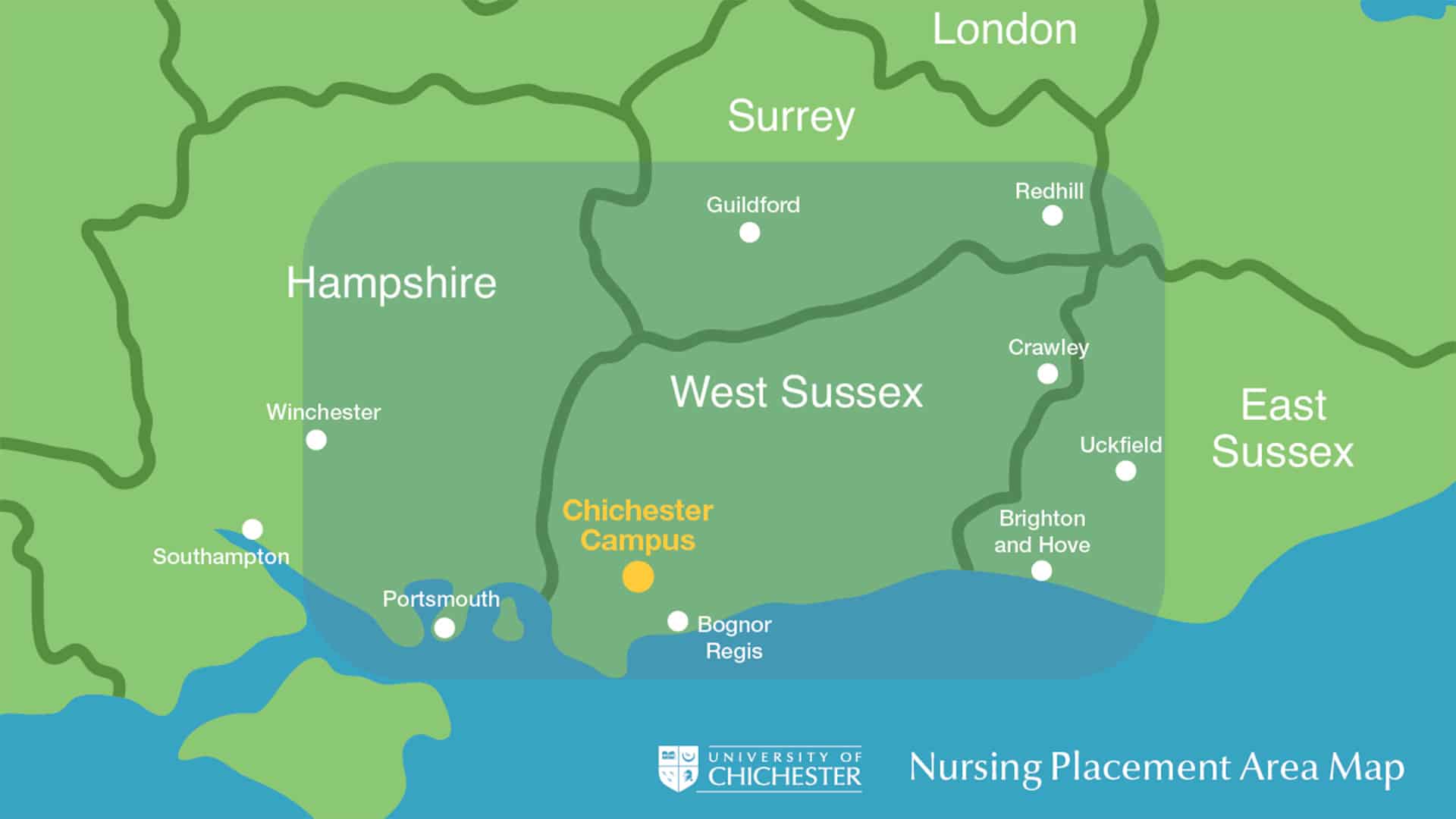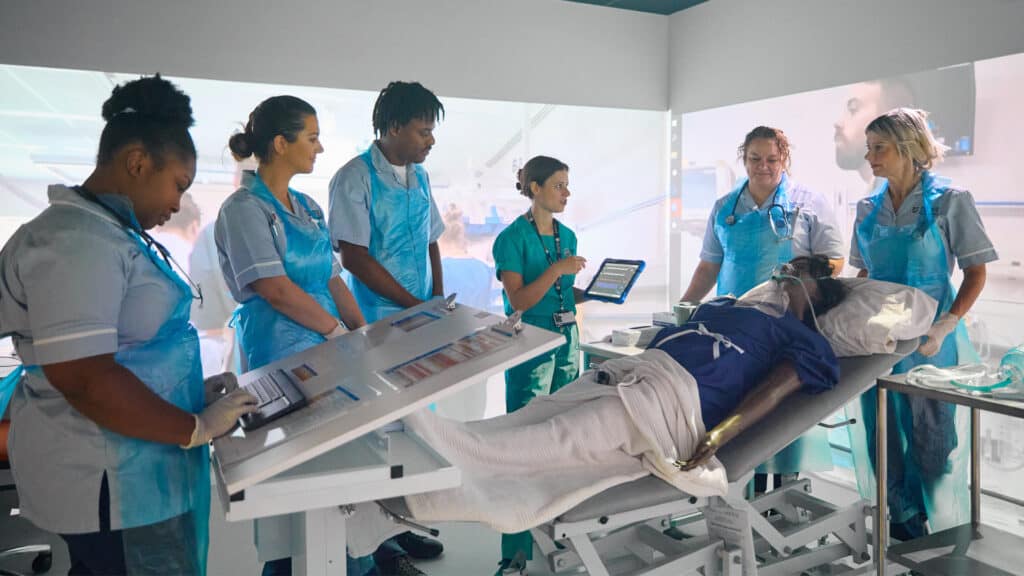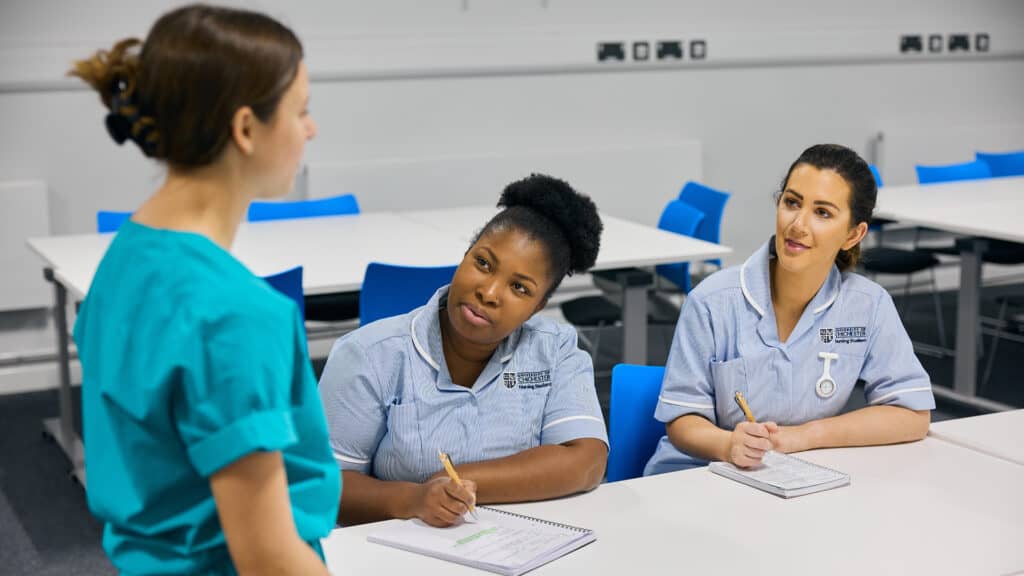Overview
Earn as you learn to become a Nursing Associate
Important
Applicants for this course are recruited directly by employers, or are already employed by the NHS, private, or voluntary organisation.
This course prepares you for future employment as a Nursing Associate, as you learn at university alongside a full-time role within a nursing team.
You can work in different areas of nursing in England such as adult, children’s, mental health or working with those with a learning disability.
What is a Nursing Associate?
Nursing Associates assist Registered Nurses in the provision and promotion of care that puts the person or people at the centre of the experience. You could work at an individual level with the person, and at a community level with people.
Finding an employer
Our Nursing Associate Higher Apprenticeship course sees your academic learning take place at the University one day a week, as you spend the other four days in your employed role.
Various local employers advertise these roles. You can contact our team who can help you find these roles before you undertake the course.
Become a caring and compassionate Nursing Associate
You will learn to care for people who may be vulnerable and require caring activities across the full range of the life span, and the four fields of nursing:
- adult
- children
- mental health
- and learning disability.
Throughout the course, you will learn to treat everyone with dignity and humanity, whilst taking responsibility for your own actions.
Benefit from excellent levels of support
Our commitment to small class sizes coupled with our team of empathetic and experienced teaching staff ensure that all learners benefit from elevated levels of excellent academic and personal support.
Any additional learning needs are identified early to ensure that specific support is put in place, and we provide dedicated sessions for those with neuro-divergency.
Experiential learning through cutting-edge technology
Our brand-new facilities offer innovative teaching methods that provide immersive learning experiences and simulation-based learning, allowing you to engage with scenario-based activity using robotic manikins, virtual reality, and actors to reflect real situations.
Head of School of Nursing and Allied Health Dr Nita Muir has published international research in virtual simulation learning and Senior Lecturer James Wilson is a National Teaching Fellow with expertise in Forum theatre.
A rich history of nursing education
In 1973, the 25-year-old Graylingwell School of Nursing combined with Royal West Sussex and St Richard’s Hospital School of Nursing to form Chichester and Graylingwell School of Nursing, which was responsible for most nurses who practiced in the area before it closed in 1978.
The School of Nursing and Allied Health at the University of Chichester now takes up the mantle to promote and develop nurse education in the local area.
Gain the right knowledge and skills
This course provides you with the required knowledge, skills, and values you need to meet the Nursing Associate Degree Apprenticeship, Nursing Associate Standards, and Nursing and Midwifery Council for level 5 recognition.
This course is accredited by the Nursing and Midwifery Council.
The Course
Learn at university one day a week alongside your professional role
This course provides you with the required knowledge, skills, and values you need to meet the Nursing Associate Foundation Degree Apprenticeship, the Nursing and Midwifery Council Nursing Associate Standards, and complete a Foundation Degree in Science at level 5.
The course has a 50/50 split between theory and practice activity across both University teaching and learning with your employer or via external placements. Each year of the programme is constructed with blocks of theory and blocks of practice.
Indicative modules
The following list is indicative and subject to future change.
Year One
- Foundations of health and Well-Being for Nursing Associate Practice
- Become a Professional Nursing Associate
- Delivering Person-Centred Care as a Nursing Associate
- Preparation for Nursing Associate Practice Part 1
Year Two
- Understanding Illness to deliver Person-Centred Care for Nursing Associates
- Developing the Professional Nursing Associate Role
- Preparation for Nursing Associate Practice Part 2
Course outcomes
Upon successful completion of this course, you will receive:
- A FdSc Nursing Associate academic award
- A Higher Apprenticeship award
- The ability to register as a Nursing Associate with the Nursing and Midwifery Council
Teaching and Assessment
Feel the support of our expert and experienced staff
Attending university
You will attend university for one day per week and attend your workplace for the other four workdays. During your induction, there will be support for your transition into Higher Education.
Learn from expert and experienced practitioners
You’ll be taught by academics, with many who are registered practitioners from a variety of clinical backgrounds. Healthcare qualifying degrees offer a range of options for future employment both internationally and nationally. Roles can be within emergency care, primary care, end-of-life care and development into becoming advanced practitioners.
Smaller class sizes for better support
Our dedication to smaller class sizes means that our team of expert academic staff get to know you and your needs as an individual.
You will attend classes including lectures, seminars, interprofessional learning, workshops, practical sessions, and simulations. You will work collaboratively with other students on the course as well as having service user and carer input.
Learning through work is a recognised learning activity, there will also be dedicated time for you to drive your learning through independent learning and reflection.
End Point Assessment: Final Apprenticeship Portfolio
The End-Point Assessment (EPA) is the final assessment and is integrated within this course. Your End-Point Assessment takes place during the practical period of your course and forms part of the credit awarding modules.
You must meet the following criteria before EPA:
- Complete all required modules of the foundation degree which includes the mandatory protected learning time of 2,300 hours and a minimum 460 hours of external practice placements.
- Complete the Practice Assessment Document (PAD) and be signed-off by practice and academic assessor.
- Achieve the Nursing Associate Standards for knowledge, skills, and behaviours.
- Satisfy your employer and training provider that your knowledge, skills, and behaviours are consistently demonstrated.
- Have qualifications in English and Mathematics at Level 2.
Facilities
Experience brand new on-campus facilities that help you thrive
School of Nursing and Allied Health
The School of Nursing and Allied Health is based on the Bishop Otter campus, you will learn both on campus and in a variety of practice and simulation settings.
All learning will be supported by our lecturers in a safe and controlled setting and by your practice assessors and supervisors in health and social care environments.
Immersive sensory learning technologies
Explore our immersive learning room that recreates sounds and visuals from a range of clinical settings, supported with the latest virtual reality technologies.
Six-bed ward environment
Our six-bed ward environment recreates a hospital setting, allowing you to practice basic nursing skills in a realistic simulated setting.
Robotic mannequins
Our responsive robotic mannequins allow you to simulate a variety of clinical procedures and situations ahead of your placement experiences.
Immersive sensory learning technologies
Experience our immersive learning room that recreates sounds and visuals from a range of clinical settings, supported with the latest virtual reality technologies.
Simulated community nursing settings
Practice your communication skills and managing difficult situations via Forum theatre and with actors in our community flat and GP surgery.
Expert and supportive staff
Our experienced teaching staff include clinicians in practice and are here to support you as you develop into a competent graduate nurse.
Specialist library facilities
You will have access to additional resources available from our partners who support your practice learning, including the specialist library facilities at the local St Richard's Hospital.
Develop your digital competency
Gain critical experience of digital materials such as clinicalskills.net, Electronic Practice Assessment Documents and anatomical software with Hololens technology.
Learning and social hub spaces
Our commitment to a friendly and inclusive student community includes dedicated learning and social spaces within our HealthOne building.
Learning Resource Centre
The Learning Resource Centre (LRC) contains the library, a café, IT/teaching rooms, and the Support and Information Zone (SIZ).
Work Placements
Transfer the theory into real life practice
Gain vital practice experience
The majority of your practice learning will take place in your Base Placement which is the area you are employed in.
You will also undertake four external placements over the two years which the University and your employer will base on your learning needed and proficiencies, each one lasting for six weeks.
These placements range across a variety of clinical settings to ensure you experience all fields of nursing, a variety of clinical settings and the range of hours expected of registered nursing associates.
Placement Allocation
Whilst placement allocation is based on availability across the sector, it is non-negotiable as they are allocated to ensure that you can have exposure to the relevant fields of nursing and clinical areas. Consideration of your home address and travel required is taken into account during placement allocation.
Additional Placement Options
There is an option for you to arrange bespoke placement days to enable you to experience areas of particular interest or that you feel you have not had exposure to during your course. These are arranged in discussion with your Practice Assessor and Academic Assessor.
Expect to:
- Attend across the 7 day week 24/7
- Travel 1.5 hours one way to placement
- Work in a range of clinical settings i.e., at home, in community and at hospital

Please note the map above provides an overview of the placement areas and not an accurate representation. Placement travel time will usually be up to an hour and a half from the Bishop Otter campus.
Careers
Graduate ready for a career in healthcare
Become a core part of a healthcare team
Nursing Associates are a key part of the multidisciplinary teams that care for patients.
You will be able to demonstrate an elevated level of compassionate leadership, excellent digital literacy skills, resilience and evidence-based knowledge which is person-centred and will prepare you to enter a modern-day nursing workforce.
Potential Careers
As a registered Nursing Associate, you are able to apply for NA roles in England in any of the four fields of nursing across the different clinical settings in primary, secondary and tertiary care.
Career support
As a University of Chichester graduate, we will provide you with clear guidance for future career choices across the healthcare sector. There will be an opportunity to attend many recruitment fairs with local employers, who will be keen to recruit you.
Opportunities to progress onto degree courses
You can use the credits from your final FdSc award from this course to shorten a registered nurse degree course.
Course Costs
Your employer will pay your tuition fees to the University so you will graduate without tuition fee debt.
As an employee you will receive your salary from your employer and be eligible for employee benefits while you study. You will not be eligible for a student loan.
To find out about any additional costs on this course, please see our Additional Costs page.
Course specific costs
- One uniform will be provided but you are likely to require additional uniforms which cost in the region of £30.
- You will need a pair of suitable comfortable shoes while on clinical placement and studying in our simulation settings (estimated cost £40- £60).
- You will need to purchase some of your own clinical items, for instance a stethoscope and fob watch (estimated cost £30).
- You will need to be able to travel to your placement.
- You will be required to have a satisfactory enhanced Disclosure Barring Service (DBS) check costing £40, which needs to be paid for before the start of the course. Your employer may be able to pay this for you.
Entry Requirements
Typical offer (individual offers may vary)
You will be required to have one of the following plus GSCE C/4 or Functional skills Maths/English completed prior to the course start date:
A Level
BTEC National Diploma
BTEC Extended Diploma
GCSE
NVQ
Access to HE Diploma
Level 3 Apprenticeship
Recognition of Prior Learning (RPL)
Applicants will be considered on an individual basis in line with the University’s Admissions policy and the Nursing and Midwifery Council Standards and requirements.
Other qualifications
Other qualifications (including the Care Certificate and HEE approved Bridging Programme), alongside relevant and substantial work experience, will be considered at an individual level.
Additional requirements
- Demonstrate capability for digital and technological literacy.
- Be able to show evidence of 12 years of general education (4-16).
- Candidates should normally be employed for a minimum of 30 hours per week to be eligible under the Higher Apprenticeship scheme
- Evidence of study within the last 5 years (not mandatory training)
- Evidenced nursing values through interview process with the University (with employer)
- On-line numeracy assessment arranged by the University (exemption for applicants who can provide a certificate of level 2 maths attainment, or equivalence, within last 12 months)
- Complete satisfactory occupational health assessment and a new enhanced criminal records check/ disclosure and barring service [DBS] is required prior entering the programme (both are organised by your employer).
- Complete a satisfactory interview with the Employer, University and Service User/Carer as appropriate.
Other factors to consider
Nursing Associate higher apprentices are recruited directly by employers or are already employed by the NHS, private, or voluntary organisation.
The University of Chichester is looking for highly motivated learners who possess the human qualities, plus knowledge and skills required to successfully complete the course. Learners who have:
- a realistic understanding of the nature of nursing
- an understanding of the likely demands of the course – how are you going to fit it into your current lifestyle?
- an ability to link ideas from their own life experiences, study skills, English proficiency and literacy, numeracy, plus digital and technology literacy when undertaking the Nursing Associate apprenticeship.


